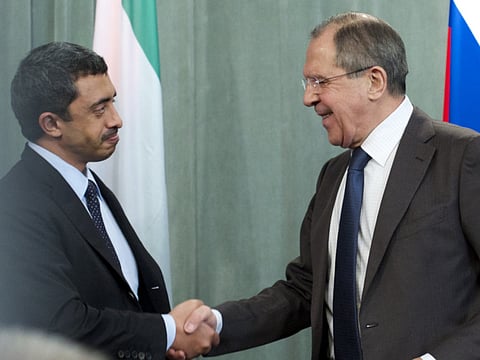No difference between Daesh and Iran-backed groups - UAE
Saudi Arabia extends sanctions against Hezbollah, sanctioning companies and freezing assets

Dubai: There is no difference between the Daesh and Al Nusra terror groups and Iranian-backed organisations operating in the Middle East, the UAE foreign minister has said.
Shaikh Abdullah Bin Zayed Al Nahyan said in Moscow on the sidelines of the Russian-Arab Cooperation Forum that Iran supports terrorist organisations and seeks to spread sectarian extremism in the region with no regard for the sovereignty of states.
“We don’t distinguish between Daesh and Al Nusra front on the one hand, and Iranian backed groups on the other,” he was quoted as saying by Sky News Arabia.
The statement came as Saudi Arabia extended sanctions against the Lebanese Iran-backed militia Hezbollah that is accused of sending militants to fight in wars in Syria and Yemen.
The kingdom froze the assets and prohibited dealings with three Lebanese nationals and four companies.
It named the individuals as: Fadi Hussain Sarhan, Adel Mohammad Sheri and Ali Hussain Zuaitar.
Saudi Arabia also sanctioned Vatech Sarl, Le-Hua Electronic Field Co Ltd, Aero Skyone Co Ltd and Labico Sal Offshore.
The United States Treasury Department last year sanctioned Beirut-based Sarhan and his firm Vatech Sarl, along with Sheri, of Shenzhen, China, and his firm Le-Hua Electronic Field Co.
It said they were responsible “for providing material support to enhance the group’s military and terrorist capabilities.”
Sarhan purchased unmanned aerial vehicles, while Sheri facilitated Hezbollah’s efforts to obtain electronics “for transport to Yemen for use in improvised explosive devices by the Huthis”, the US Treasury Department alleged.
On Tuesday, Riyadh urged Saudis to leave Lebanon and to not travel there “for their safety”, after the kingdom halted a $3 billion programme funding French military supplies to Beirut.
Riyadh cut the aid in response to “hostile” positions linked to Hezbollah.
Qatar and Kuwait followed with similar travel advisories. But the UAE went further, banning its nationals from travel to Lebanon and reduced diplomatic representation there.
The crisis in ties between the Gulf states and Lebanon has fuelled concerns of potential economic ramifications for Lebanon, which has hundreds of thousands of expatriates working in Gulf Arab states.
Lebanon’s central bank governor said on Friday he saw no risk to the Lebanese pound and it remained bank policy to keep it stable, adding that he had not been informed of any measures by Saudi Arabia targeting the Lebanese financial sector.
Riad Salameh said that media reports about the size of Saudi deposits at the central bank were inflated, and that neither Saudi Arabia nor other Gulf Arab states had been in touch about deposits.
He said he hoped the government would get “its act together to reestablish good relations with Saudi Arabia, as Lebanon has always been an economic partner with the kingdom”.
Local media reports say some worried citizens were changing their accounts in Lebanese pounds to US dollars but officials say people should not worry about the pound since the Central Bank can defend it with its $40 billion foreign currency reserves.
Lebanon’s political elite is deeply divided between two powerful Saudi and Iran-backed coalitions. The spat has exacerbated divisions among Lebanon’s notoriously fractious politicians, who traded accusations over the billions of dollars lost. Lebanon has been without a president since May 2014 and parliament has failed to elect a new head of state because of lack of a quorum.
Concerns have been sparked that further steps could be taken by Saudi Arabia and its neighbors, such as gulf airlines halting flights to Beirut or the eviction of thousands of Lebanese who work in the oil-rich region, a move that would have a devastating effect on Lebanon’s crumbling economy.
There are some half a million Lebanese living in the gulf. They transfer billions of dollars to their home country in remittances, giving a boost to Lebanon’s economy, which has among the highest debt in the world - currently standing at $70 billion or 145 per cent of GDP.
On Thursday, Yemen’s internatinoally recognised government confirmed that Hezbollah is involved directly in the war in the country between the government and the Al Houthi militia and forces loyal to the ousted Yemeni president Ali Abdullah Saleh.
The official Yemen News Agency quoted the official Yemeni government spokesman Rajeh Badi as saying that the government has physical evidence showing the extent of the involvement of individuals belonging to Hezbollah in the war against the Houthi militia on the Yemeni people.
He added that its fighters have been deployed to help Al Houthi militants and the supporters of ousted president Ali Abdullah Saleh.
“The participation of the Hezbollah in the missions they carry out in Yemen has intensified on several levels, and is not confined to the official ‘moral support’ claim,” he added.
“They are actually participating on the ground through training militia members in fighting. They are present on the border with Saudi Arabia, planning battles, arranging infiltration attempts and carrying out sabotage operations inside the Kingdom of Saudi Arabia,” he said.
In a statement to the Yemeni News Agency, Badi said that the evidence was robust. “Hezbollah cannot deny its role in the devastation and the obvious moral and logistical support it is providing. Hezbollah is directly responsible for prolonging the war and for bringing devastation to Yemen and its people in a blatant violation of United Nations Resolution 2216 and in a flagrant challenge to the international community,” he added.
- with inputs from agencies
Sign up for the Daily Briefing
Get the latest news and updates straight to your inbox


